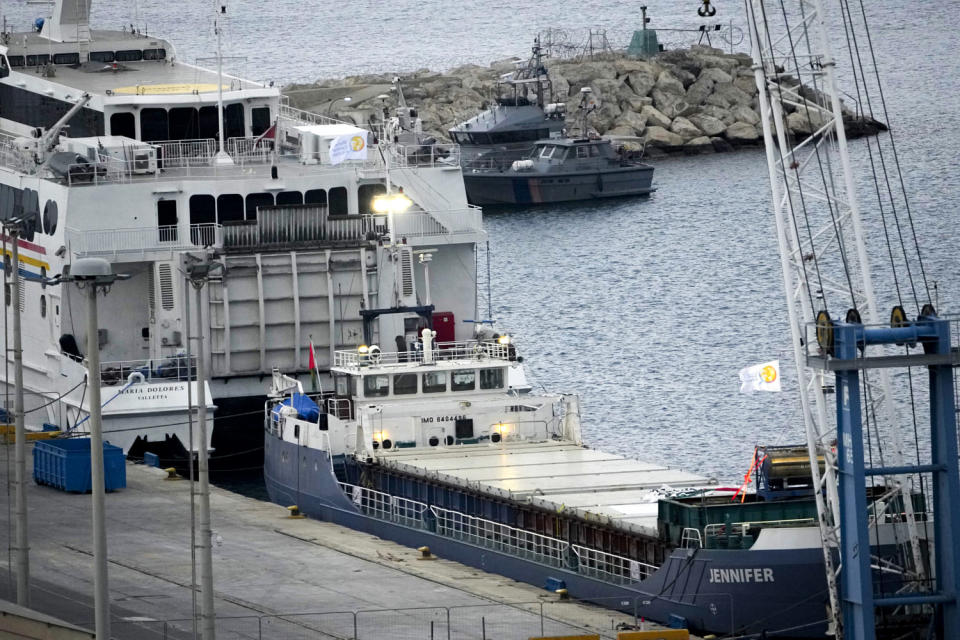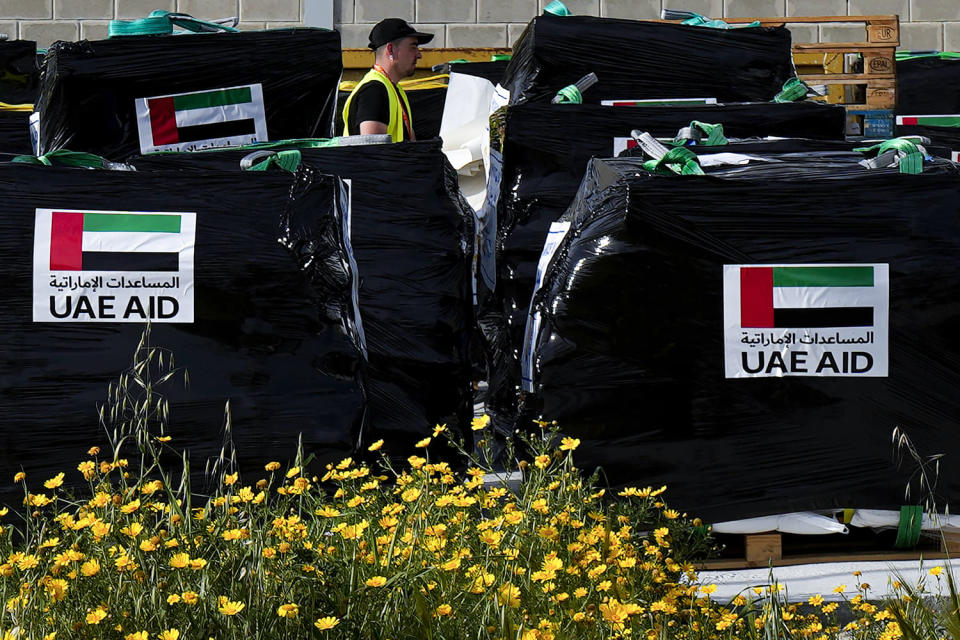Second aid ship expected to set sail for Gaza as Palestinians await distribution from first delivery
JERUSALEM — A shipment of aid that arrived on Gaza’s shore on Friday is expected to bring some respite to starving Palestinians in the enclave’s north — but how and when it will be distributed has yet to be seen.
Tons of flour, rice and canned foods were offloaded from the ship on Saturday, according to World Central Kitchen, the charity that collected the food and organized the maritime aid shipment. The much-needed aid was was transported 200 miles from the Larnaca port of Cyprus to Gaza by the Open Arms, a ship named after the charity.
On Sunday, World Central Kitchen, which was launched by celebrity chef José Andrés and which runs a network of around 60 kitchens across the Gaza Strip, said the aid was in a warehouse and had yet to be distributed.
The statement countered an update from COGAT, Israel’s military liaison with the Palestinians, which said that 12 World Central Kitchen trucks had “distributed the aid” from the maritime delivery in northern Gaza.
World Central Kitchen emphasized that the aid was still awaiting distribution. COGAT did not immediately respond to a request for comment on the discrepancy.
The location of the warehouse where the aid was being held and the plan to distribute the food was not immediately clear.

John Spencer, a retired Army infantry officer who now serves as chair of urban warfare studies at the U.S. Military Academy’s Modern War Institute, told NBC News in a phone interview Sunday he wasn’t surprised by the lack of public information around the plans for the distribution of the aid shipment.
Noting a recent string of deadly incidents in which Palestinians have been killed while waiting for or trying to access much-needed aid, he said: “It makes a lot of sense to me that details of the distribution of the aid are being very close-held.”
He also noted that organizers would be unlikely to distribute aid from the same point more than once due to safety concerns. “They’ll probably move points around,” he said. “If you set up one point, that just gives bigger chances for bigger crowds and chaos.”
Spencer was also unsurprised by discrepancies in statements from the charity and Israeli officials.
In addition to statements on the distribution of aid, there have also been discrepancies around how much aid was included in the maritime shipment, with the World Central Kitchen saying 200 tons of aid was on the Open Arms vessel, while COGAT initially said there were 115 tons, before shifting to 200 in a later update.
Spencer said there were “lots of reasons” for such discrepancies, including the general communication issues that can arise while executing a difficult plan in a chaotic environment. But he said it would not be surprising for an aid organization to want to separate itself from military or government efforts in a conflict zone “when there’s two warring parties.”
World Central Kitchen, COGAT and the IDF didn’t immediately respond to requests for comment around the discrepancies.
World Central Kitchen had initially provided limited information on the shipment’s route to Gaza, citing security concerns.
In a statement on Saturday, it added that “this is a constantly evolving mission that changes constantly due to the realities on the ground.”
The IDF said in a statement Friday that the maritime aid shipment was being facilitated in coordination with COGAT and with the Israeli government’s approval.
It said naval and ground forces had been deployed to secure the area upon the Open Arms’ arrival, but it was not clear if the military was expected to be involved in the management or the distribution of aid — or what efforts were being made to ensure that aid would reach civilians safely after several deadly incidents related to aid deliveries.

The Palestinian Health Ministry in Gaza said on Thursday that a number of people were killed and dozens were injured while waiting for a separate aid delivery.
The IDF rejected claims that its forces fired on the crowd and shared footage it said showed “Palestinian gunmen opening fire in the midst of Gazan civilians” about an hour before an aid convoy arrived. NBC News could not immediately independently verify the IDF’s claim or determine what exactly is happening in the video.
It came after several other deadly incidents in recent weeks, including the violence on Feb. 29 during which more than 100 Palestinians were killed as they gathered in anticipation of the arrival of much-needed aid.
The Israeli military said the majority of people were trampled on or run over in the incident, but witnesses said Israeli soldiers killed civilians, shooting at them and firing tank artillery shells.
Friday’s nautical aid delivery came amid mounting frustrations over the lack of aid flowing into Gaza, despite tons of food and supplies sitting on trucks in Egypt awaiting permission to enter the enclave, where Palestinians are facing starvation. The United Nations warned that around a quarter of Gaza’s 2.3 million residents are “one step away” from famine. Already, Palestinian health officials have reported dozens of deaths from malnutrition in the enclave, with most of the victims being children.
World Central Kitchen said it was already loading a second boat with 204 tons of food for a second sailing to Gaza — and it said it planned to “establish a maritime highway” of future boats and barges.
Israel has maintained tight control over the entry of aid, particularly through the country’s Kerem Shalom border crossing and the Rafah border crossing with Egypt.
The U.S. and its international partners have pushed for Israel to ramp up the flow of aid into Gaza, with the Biden administration recently announcing plans to build a temporary port to help facilitate future maritime deliveries.
World Central Kitchen said it had to construct a jetty built from the rubble of the war off Gaza’s shore in order to facilitate Friday’s aid delivery. Video captured by NBC News’ crew on the ground showed trucks carrying goods away from the makeshift jetty.
While aid groups welcomed the recent arrival of aid by sea, as well as via airdrops, they have have condemned plans to build the port, as well as the focus on a maritime aid route, when the most practical means of delivering food and other goods to Palestinians in desperate need in Gaza would be by land.
“Any aid that can be provided is helpful and good given the overwhelming levels of need on the ground,” Ciarán Donnelly, the International Rescue Committee’s vice president of crisis response, said in a phone interview with NBC News on Friday. “At the same time, the reality is that the most direct distance between two points is a straight line and there are cheaper and more effective and easier ways to get aid to Gaza than relying on planes and boats from airdrops and maritime routes.”
This article was originally published on NBCNews.com